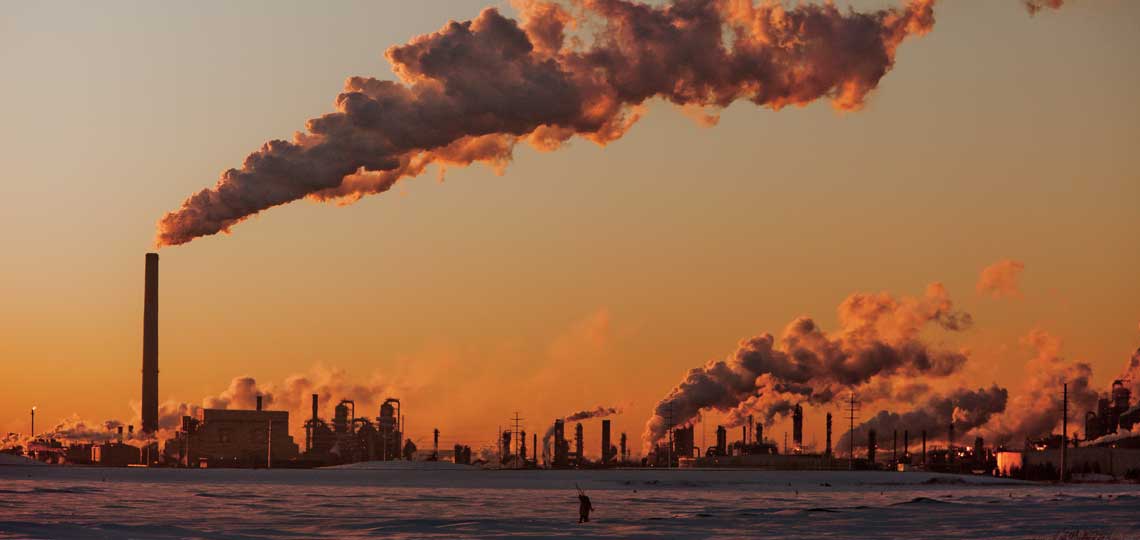Albertans are heading to the polls and the rest of Canada won’t be far behind. As campaigns rev up, Ecojustice lawyer Barry Robinson offers perspective on the greenhouse gas equivalent of the “Tragedy of the Commons.”
When it comes to climate change, many people, businesses and governments claim to play only a small part in the growing crisis. This is a big problem.
The science tells us that we have 11 years to keep climate change in check. Meeting this critical deadline will take changes in behaviour and in the law — from all of us. Otherwise, we face very real threats to human health, safety and security, and our cultures and ways of life.
Unfortunately, being honest about the changes that need to happen is not always the politically safe or popular move. And with Albertans headed to the polls on April 16 and a federal election due later this year, politicians will be tempted to downplay Canada’s role in producing greenhouse gas emissions.
It’s not a new tactic.
Politicians and industry groups have been known to argue that Canada produces less than 1.5 per cent of global greenhouse gas emissions. Industry supporters argue that the Alberta oil sands are responsible for just 0.15 per cent of the world’s greenhouse gas (GHG) emissions. And the list goes on.
The politicians and industry supporters want us to believe that we don’t have to do anything about GHG emissions because we (Canada, Alberta, the oil sands) are such a small contributor to global GHG emissions. This leads to a problem known as the “tragedy of the commons”.
The tragedy of the commons
The term “Tragedy of the Commons” was first coined by ecologist Garrett Hardin in 1968. Hardin used the example of a common grazing area shared by many herders. As each herder adds one more animal to the common grazing area, that individual herder gains the positive economic benefit of that additional animal. However, the negative impact of that additional animal, resulting in slightly less food available to all the other animals in the grazing area, is spread across all herders.
Therefore, a rational herder will keep adding more animals to the common area because he or she gets the full benefit of each added animal and only shares partially in the negative consequences. Each herder argues that they are only a small contributor to the decline of the commons because they own only a small percentage of the total animals on the common grazing area.
If all herders act in this way, the commons becomes overgrazed, collapses, and is of no value to any of the herders. Therefore, access to the commons must be regulated to avoid bringing ruin to all.
The GHG equivalent of the tragedy of the commons is each country, province, industry or project saying “I am only a small contributor to the problem. Therefore, if I add one more tonne of GHGs to the atmosphere it shouldn’t be a problem.” Thinking rationally, each industrial operator that adds one more tonne of GHGs to the atmosphere gets the full economic benefit of that additional GHG-producing activity while the negative consequences are spread across the globe.
No free passes when it comes to tackling climate change problems
In a ranking by the European Union of 208 countries, Canada is ranked in seventh place in terms of total GHG emissions. Therefore, if Canada argues that we are only 1.5 per cent of global emissions and therefore insignificant, we are also saying that the GHG emissions of 201 other countries are insignificant. If Alberta were a country, the province would be ranked 22nd out of the 208 countries. The Alberta oil sands alone would rank 52nd. The Teck Frontier oil sands project alone, with 3.9 megatonnes of GHG emissions each year, would have the same emissions as the country of Namibia (which has a population of 2.5 million people) and more emissions than 70 countries on the EU ranking.
Clearly, China and the USA, at 25.9 per cent and 13.9 per cent respectively of global emissions, are the big players and must contribute to reducing global emissions. However, no country, province, industry or oil sands project, can claim that they are insignificant. Is it just that Alberta should approve the Teck Frontier oil sands project, with more emissions than 70 countries in the world, when the world is heading towards a climate catastrophe?
As was the case for the common grazing area, the answer is regulation. This is why we need the Paris Agreement as a global framework to reduce GHG emissions and why we need Canada and the provinces to set and enforce aggressive GHG reduction plans. These laws and policies don’t always lend themselves to the most attractive political slogans, but they’re necessary if we truly want to secure a healthy climate for future generations.
There are no free passes in the fight against climate change. No contributor is insignificant if we are to avoid the tragedy of the global climate commons.
Photo of oil sands near Fort McMurray, Alta. by kris krüg, via Flickr. Image obtained under Creative Commons.

